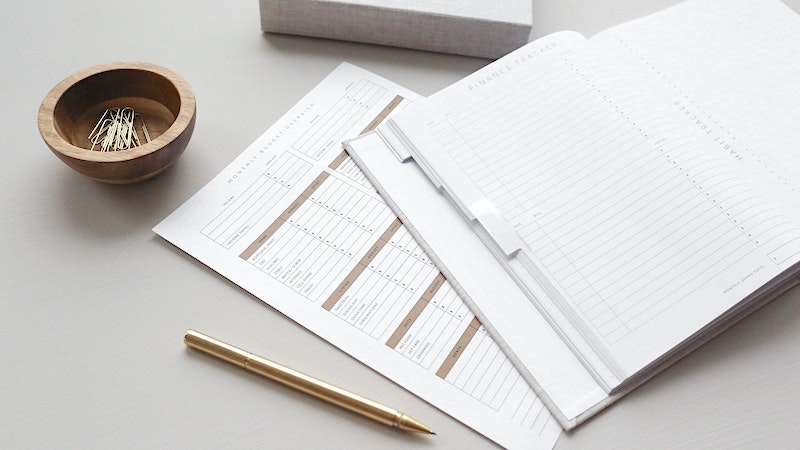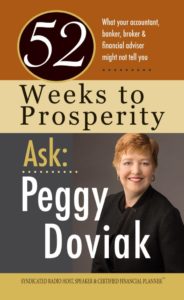This post may contain affiliate links. Full disclosure policy

I’m grateful to my fierce friend, Peggy Doviak, for sharing some wisdom on strategies and tasks for the difficult process of coping with financial uncertainty during Corona.
Peggy is the author of 52 Weeks to Prosperity along with other guest blogs posts you can find on my site like paying for college, advice about prosperity vs. money, setting financial goals, saving for retirement and curbing your holiday spending. She has a wealth of advice and we’re all better served by having a professional like Peggy in our corner.
Financial Uncertainty During Corona
The second roaring Twenties began with so much hope a mere five months ago. However, that optimism feels distant now. We’re staying home, wearing masks, chapping our hands with soap and water, and still fearing the virus will find a way to attack us. Additionally, with lost jobs and cut hours, we don’t know how we’re going to pay our bills. Money concerns often create stress, but right now, it feels like an outright nightmare. I want to offer both hope and suggestions to help you tame your monsters.
First, stop beating yourself up. I’m sick and tired of hearing financial celebrities talk about the emergency fund we’re all supposed to have. Of course, a savings account is great, but many people live month to month. If you are in that position, don’t be ashamed. Fear and regret are crippling emotions, and they can hinder your ability to create a solution. Raise your eyes, and start making a plan.
Looking at Your Monetary Needs

Your way out begins by taking a close look at the money you spend. How much do you need each month to survive? What’s your rent or mortgage? Car payment? Utilities? Groceries? Calculate how much money these bills (and likely more) require. If you can cover them with income, you’re in pretty good shape.
If not, use your stimulus check and any savings to help bridge the gap. Additionally, recent legislation allows you to withdraw up to $100,000 from an individual retirement account (IRA) as a coronavirus-related distribution (CVD). You have three years to pay the money back, and the IRS treats it as a tax-free transaction if the distribution covers pandemic-related expenses or lost wages. If you are under 59 ½, the IRS is even waiving the 10% penalty. Although the plan seems to define financial loss broadly, some of the details for qualification are still a bit ambiguous. As a result, you should talk to your tax professional before you take action, only use what you need to survive this current crisis. You will want to be able to retire someday, even if that seems distant right now.
Not everyone has a large retirement account, however, and you may not be able to pay all your bills. If so, contact the lenders immediately. Explain the situation, and see if they will work with you. If you can get an extension and your cash flow is dicey, you might want to take advantage of the deferral. Life won’t return to normal any time soon, so you want to try to stretch available cash. You should reserve money to pay expenses, like groceries, that can’t be postponed.
If you have a credit card, use it only as a last resort unless you can pay it off. If you defer payments and acquire debt, you will create a financial hole that will be difficult to escape once this is over.
Finding Temporary Sources of Income
Another source of relief is unemployment. Fortunately, Congress has expanded unemployment in several ways. First, if you are self-employed and cannot work, you may now qualify for unemployment benefits. In the past, gig economy workers, freelancers, and others who worked for themselves had a difficult time qualifying. However, legislation eased the requirements. Additionally, the amount of weekly benefit has increased by $600, and the benefit period has been extended by thirteen weeks.
Remember to claim unemployment, you must have been fired or furloughed, suffered a reduction in hours, or are unable to work because of state or local decisions. Unfortunately, you likely won’t qualify for unemployment simply because you are afraid to go to work. I know it’s difficult, and you may have health conditions or live with someone who is compromised. States that are opening early can force employees to make difficult decisions. I can’t offer any advice here; I’m just sorry it’s happening to you.
If you’re a business owner, you have an additional set of concerns. Fortunately, new benefits may be able to help you with some of them.
The Payroll Protection Program
First, if you did not receive any of the Payroll Protection Program (PPP) before it ran out of money, you’re in luck. Congress has added $300 billion more. However, don’t waste any time. I expect the new program to run out of money rapidly, even if larger companies can’t make claims.
The PPP offers you a loan valued at 2.5 times your monthly payroll expenses. You calculate this number by taking the average of your 2019 monthly payroll. If you keep (or hire back) your employees and use 75% of the loan for payroll expenses within sixty days, you don’t have to repay it! You can use the other 25% for operating costs like rent, mortgage interest, and utilities. If you don’t keep your employees, the loan must be repaid.
I know applying for the PPP has been frustrating for many business owners. One common problem has been not having a well-established banking relationship. If you don’t already have one, please consider opening a checking or savings account. Banks have “know your customer” rules, and some banks have had problems processing PPP loan applications from people they do not know. Having a banking relationship is important for an individual, but it’s critical for a business owner.

Looking to Your Community
Finally, even if you are not a member of your community’s Chamber of Commerce, check their website. Many Chambers are offering pages of tips and resources for business owners trying to survive the pandemic. Depending on your community, joining the Chamber might also provide you with some ongoing assistance as your business recovers from this disruption.
Many individuals and business owners have seen their financial lives turned upside down over the last two months. By taking some steps, you can keep a bad situation from spiraling further out of control. Few people are sleeping well right now, but by creating a plan for your financial survival, you may sleep a little bit better.
So many things surrounding the current situation are out of our hands, but I hope my suggestions will help you take heart and grab hold of those responses that are within your control. I wish you well, friends.
– Peggy
This article is educational, not investment advice. Investing is risky, and you can lose money. Talk to your financial team about any strategies before you implement them.
Meet Peggy Doviak
 CERTIFIED FINANCIAL PLANNERTM practitioner, Peggy Doviak, knows how stressful money can be. Her fifteen years as a financial planner and a national speaker to both financial professionals and consumers have convinced her that most people fear their money. That’s why she wrote 52 Weeks to Prosperity – Ask Peggy Doviak: What Your Accountant, Banker, Broker & Financial Adviser Might Not Tell You. In it, she addresses 52 financial planning topics to enable individuals to become comfortable with the vocabulary and issues of their financial lives, so they can participate in the planning process with a professional. Learn more about Peggy on her website, www.peggydoviak.com.
CERTIFIED FINANCIAL PLANNERTM practitioner, Peggy Doviak, knows how stressful money can be. Her fifteen years as a financial planner and a national speaker to both financial professionals and consumers have convinced her that most people fear their money. That’s why she wrote 52 Weeks to Prosperity – Ask Peggy Doviak: What Your Accountant, Banker, Broker & Financial Adviser Might Not Tell You. In it, she addresses 52 financial planning topics to enable individuals to become comfortable with the vocabulary and issues of their financial lives, so they can participate in the planning process with a professional. Learn more about Peggy on her website, www.peggydoviak.com.
Looking for more tips on goal-making and planning? Check out Peggy’s other post on budgets!


